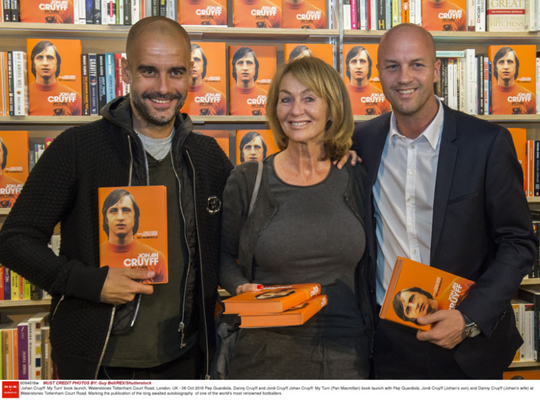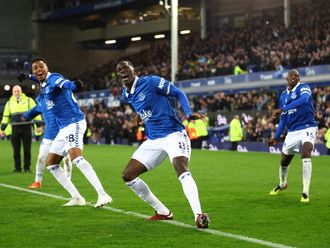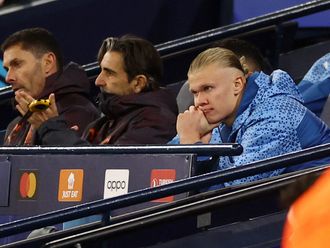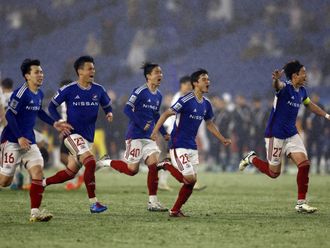
Abu Dhabi: Nearly eight months after his legendary father Johan’s death from lung cancer at the age of 68, Jordi Cruyff understandably still struggles to accept that his guiding light and inspiration is gone.
“I think even though you know when it’s a serious illness with many times a sad ending, you’re never really prepared to lose a father, even though you know it will happen,” the 42-year-old tells Gulf News in an exclusive interview. “When he’s not here, you feel a huge emptiness.”
As does the world of football.
For it is a truth, universally acknowledged, that few figures will leave as big an imprint on the Beautiful Game as Johan Cruyff,
As a wondrously elegant player for Ajax and the Netherlands, his sinuous movement, Beatles-esque long hair and charismatic personality beguiled millions and saw him named Europe’s best player three times in the 1970s. Having a piece of skill named after him, his iconic ‘Cruyff Turn’ at the 1974 World Cup finals, was perhaps the ultimate honour, however.
His managerial career was equally impactful. A true visionary, he established the passing, possession-based football at Barcelona in the late 1980s and early 90s which remains entrenched in the culture of his old club and in the Spanish national team.
Cruyff’s outstanding legacy is celebrated in a posthumous autobiography ‘My Turn’, which was published last month and compiled from audio recordings he made in the final year of his life.
For his son, the book has helped him cope greatly with his immeasurable loss – as have the welter of anecdotes he has heard from Cruyff’s devotees worldwide.
“The reaction from people, the positive energy, the love [they have shown] is overwhelming. That gives you a feeling of immense pride and you can say that he’s a man that truly left something behind,” Jordi says.
Why did he matter so much to people?
Jordi says firstly Cruyff connected with ordinary folk given that he was a product of street football and had emerged from a normal, working-class upbringing in Amsterdam to inspire a footballing revolution.
He was the central cog in Rinus Michels’ ‘Total Football’ tactics with Ajax and the Netherlands and went on to implement his own game-changing philosophy at Barcelona.
But off the pitch, Cruyff also strove relentlessly to make a difference.
Fundamental to this was the establishment in 1997 of his Johan Cruyff Foundation to provide sporting opportunities for children, especially those with disabilities. To that end, it has built more than 200 ‘Cruyff Courts’ worldwide, small football fields with artificial grass, integrated into neighbourhoods.
“That was the human aspect of my father,” Jordi, who played under his dad at Barcelona for two seasons in the 1990s and is now the technical director of Israel’s Maccabi Tel Aviv.
In 1999, Cruyff founded the Johan Cruyff Institute to offer a sport management course to athletes retiring from sport – particularly those who have had to do so prematurely due to injury – “so they have something to fall back on”.
“My father in his book writes that he never finished school and he knew that he could have had bad luck with a career-threatening injury 30 or 40 years ago,” adds Jordi, who also played for Manchester United and made nine appearances for the Dutch national in a 16-year career between 1994 and 2010.
Stressing the benefits of a good education was a constant mantra in the Cruyff household, Jordi recalls.
“He always pushed us to study and get good grades in school,” he says of himself and his elder sisters, Chantal and Susila.
And while obsessive about football, Cruyff ensured this never affected family life.
“He was capable of switching off mentally from the moment he came in the house, even after a good result or bad result.
“He was always loving, always cared and was never tired. He had too much energy and was always ready to do anything. If he wanted to go surfing, he’d get on a board. If it was skiing, he’d just go skiing.
“He was very active.”
What was the best piece of advice he offered Jordi?
“He was always a believer of his ideas, no matter good or bad results. He always believed in his own vision and he always told me: ‘Follow your gut instincts’. If you have good intuition, everything will pay off eventually.
“If you go down, do so with your own ideas and never fail with someone else’s ideas.
“At the time, his beliefs at Barcelona were revolutionary and some people thought he was mad. He’d maybe have one defender in the whole 11, but he believed in that kind of football.”
Sound familiar? The man he managed at Barcelona, Pep Guardiola, is unarguably his greatest disciple and heir apparent – having sought to employ and enhance Cruyff’s ideals as manager of Barcelona, Bayern Munich and now Manchester City.
The apprentice adored the master – “I knew nothing about football before I met Cruyff” – says Guardiola, and the feeling was mutual.
“They thought similarly about things,” Jordi says. “My father was a big fan of Pep Guardiola and his ideas. Two things he used to preach were that attack starts with defence and defence starts with attack.
“That kind of process takes time and a lot of adjustment and shift in mentality of some people – and convincing. But so far, he’s done some good results and with time, I think he’s also going to be winning things.”
Of Guardiola’s controversial decision to jettison club stalwart Joe Hart and replace him with Barcelona’s Claudio Bravo given his supposed superior ability with his feet, Jordi says the City supremo should be backed.
“It’s a courageous decision and whether it’s right or wrong, time will tell,” he says. “That was something my father was doing in the 1980s.”
How would Cruyff have fared against Guardiola if the pair had ever faced each other?
“They’d play football for the fans to enjoy and a passing style of game. If he [Guardiola] played with one striker, my father would have played with two defenders. If Pep played with no striker, my father would have played with no defenders.”
Of the players Cruyff enjoyed watching before his death, Jordi says he felt Lionel Messi and Cristiano Ronaldo were “unlucky” to have been born in the same generation and encapsulated “the beauty of football”.
As a child. Cruyff was “a big fan” of the Real Madrid legend Alfredo Di Stefano and as a manager, “he always had a soft spot for [the former Barcelona and Brazil striker] Romario.”
“He felt he was a player with heart, on and off the pitch. But my father didn’t have problems with any players after they stopped playing. Even now, you notice the respect and love they had for him.
“I am sure we could count on any ex-player for whatever we would need. Perhaps that’s the biggest compliment of all and the Cruyff legacy.”
* ‘My Turn: The Autobiography’ is out now. For more information on the Cruyff Foundation, visit www.cruyff-foundation.org.
CRUYFF HONOURS
AJAX (as a player): European Cup x 3, European Super Cup x 2, Dutch league title x 8, Dutch Cup x 5, Intercontinental Cup x 1, Super Cup x 1.
AJAX (as a manager): European Cup Winners’ Cup x 1, Dutch Cup x 2.
BARCELONA (as a player): Spanish league title x 1, Spanish Cup x 1.
BARCELONA (as a manager): European Cup x 1, European Cup Winners’ Cup x 1, European Super Cup x 1, Spanish league title x 4, Spanish Cup x 1, Spanish Super Cup x 3.
FEYENOORD (as a player): Dutch league title x 1, Dutch Cup x 1
DUTCH NATIONAL TEAM: 33 goals in 43 appearances between 1966 and 1977










